Please share with your friends!
It’s almost Thanksgiving and I’ve been thinking about a thankful activity I used to do with my preschoolers in the Montessori classroom.
We sometimes forget about what it means to be thankful or how to express gratitude day-to-day with our kids. Typically throughout the day we remember to encourage manners and remind our children to say please and thank you.
But what does it mean when we say “I am thankful” or “I am grateful”? How do we explain this to our kids?
As we enter into the holiday season, it’s a perfect time to talk to our children about being thankful.
In the classroom, some years I made a community thankful tree with the kids which they loved! This year, I tried this activity with my three-year-old daughter, Annie, at home.
Are you looking for an easy and last minute Thanksgiving activity? Learn how we made a thankful tree at home, and how you can make one, too!
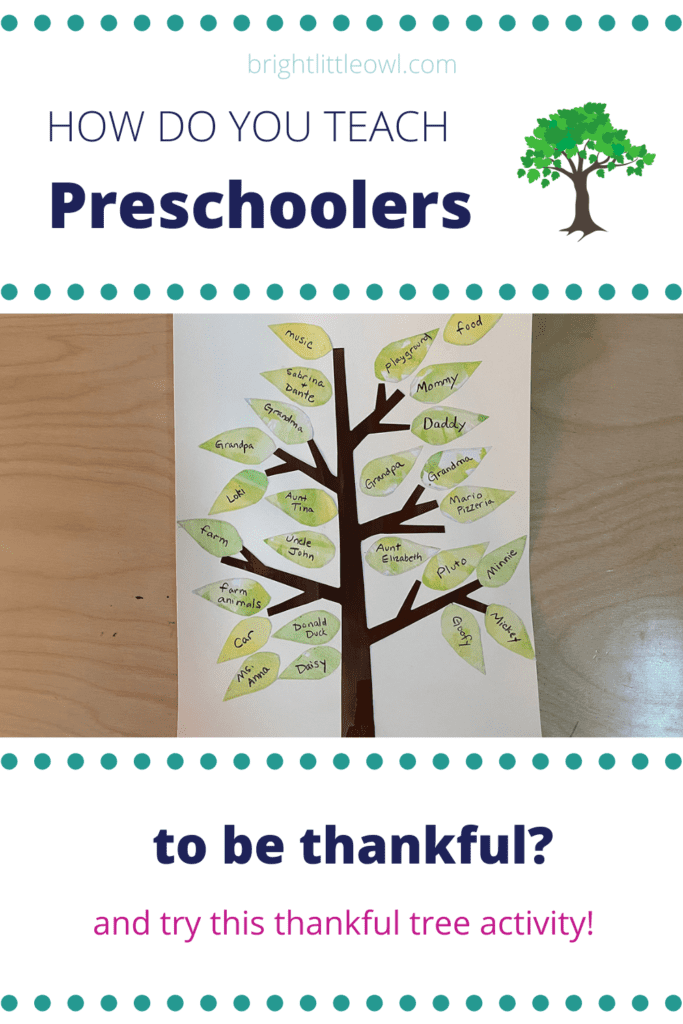
A thankful activity we did in the classroom
When I was a Montessori classroom teacher, most years we would stick a large tree on the wall made out of construction paper.
On the first day of school it would be all set up with a brown trunk, brown branches and full of green leaves made of construction paper.
At some point in September the kids made apples out of construction paper to hang on the tree, which would come down by October. Slowly we took down the green leaves and apples and and added orange, red, brown, and yellow leaves for the Fall.
Once it was November, we started to talk about thankfulness and gratitude. While reading books about the subject, we would each give examples of things that we were grateful or thankful for.
We added hand-shaped leaves to add to our tree, and turned it into a community thankful tree!
One at a time, I would sit with the children and we would trace their hand with a pencil on a Fall-colored construction paper. Then I would ask what they were thankful for and why.
For instance, a child would say, “I’m grateful for my mom because she makes me really yummy dinner.” I would write this down on the child’s traced hand. We would cut out the hand shape together and stick it on the tree.
Recommended books
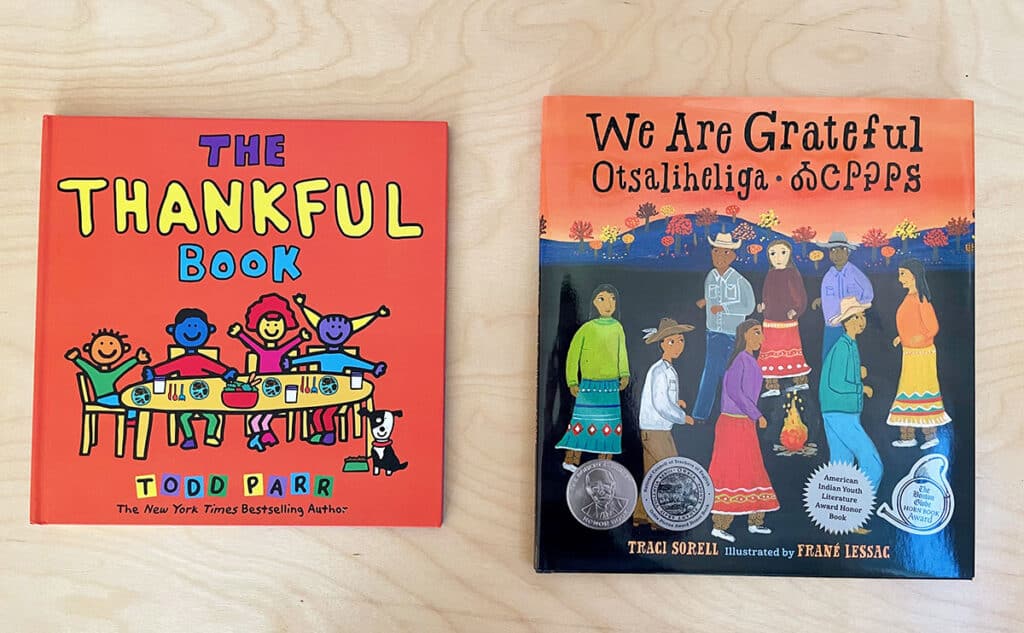
Annie loves these books I recently ordered about being thankful and grateful. They are beautiful books and I highly recommend them!
I was familiar with the Todd Parr book because we had this for my classroom, but the Traci Sorell book is new to me. It talks about the Cherokee traditions and expressing gratitude throughout the year. Check them out! Perhaps your local library has them.
How do you teach preschoolers to be thankful?
I reflected on this thankful activity in the classroom with the hand-shaped leaves. I thought, how did I teach the kids about being thankful? And how can I teach my three-year-old daughter, Annie, about being thankful?
Modeling. While working with young children, it really comes down to modeling; setting an example for the children. It’s also important to talk to the children in a way so that they can relate to what you’re saying.
I found that as adults, we can naturally model and set an example to the children about being thankful for something or someone. It can be a natural part of your conversations and daily life.
For example, a cup of colored pencils fall down off of the table and on to the floor. Without being told to do so, your child quickly goes to the pencils on the floor and picks them up, puts them back into the cup and puts the cup back onto the table.
You naturally say to your child, “thank you” for picking up the pencils. But you can also extend this further and say something like, “I am so thankful for you, and your hard work. I appreciate you and how you help and clean up.”
Ask them what they’re thankful for. Additionally, we can teach young children about being thankful by asking them what they’re thankful for. Be natural and talk about it as a part of your day using real examples.
You can give examples and say:
- I am thankful for food because it makes me strong and it gives me energy.
- I am thankful for our cat because he likes to sit on my lap and cuddle.
- I am thankful for our car because it helps us to get to different places, like to music class and to the playground.
- I am thankful for daddy because he loves us and cares about us so much.
Then, you can ask your child, what are you thankful for? Why?
What was your favorite part of the day? Another thing I used to do with the children in the Montessori classroom was to ask everyone, “What was your favorite part of today?”
We did this every day, at the end of the day “good-bye” circle. We would go around the circle and one by one, the children would share their favorite part of the day. It became a daily ritual and the children always looked forward to this. It became so important to them.
Teaching young children to reflect on their favorite part of the day is a wonderful way for them to articulate what they like and appreciate. It’s a daily exercise to help them to think about what they’re thankful for.
This is something you can do at home with your child. I am starting to do this with my daughter, Annie at bed time!
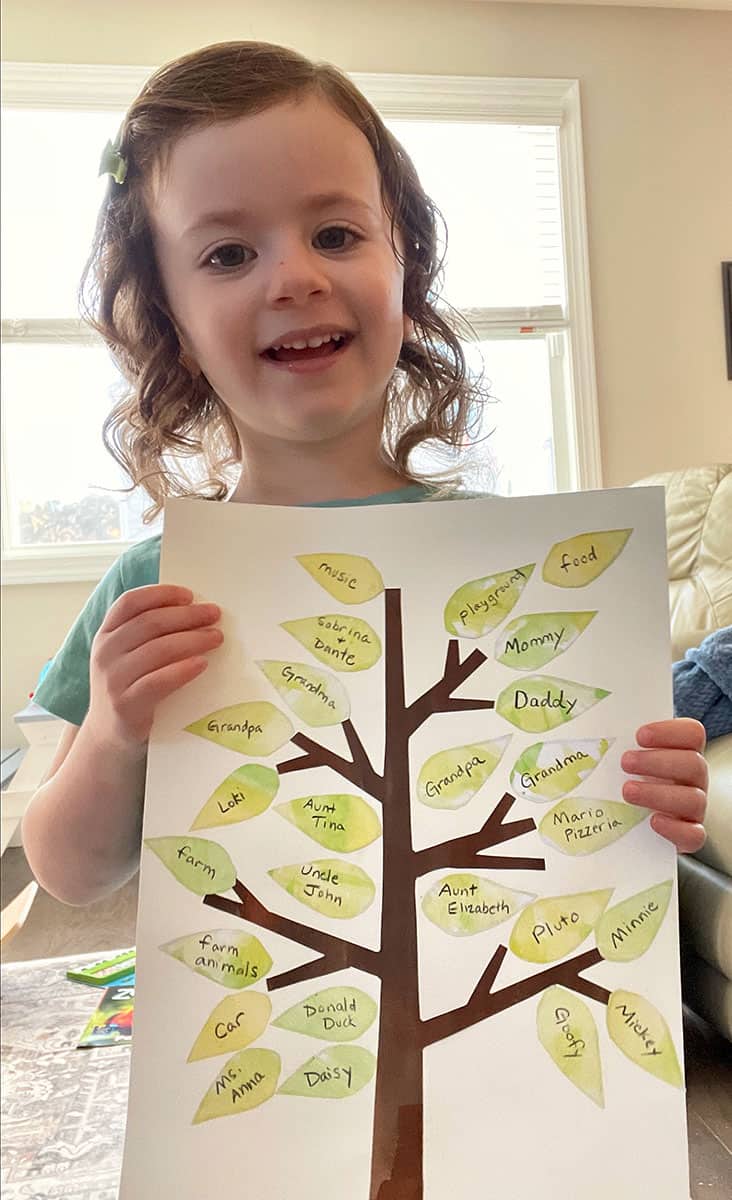
Create a thankful tree as a visual reminder
A thankful tree is a visual reminder about what we are thankful or grateful for. It’s an excellent way to reinforce to young children what we’re thankful for.
In the classroom, our thankful tree with all of the hand-shaped leaves on it was a helpful visual reminder for all of the children. It also helped with community building and teaching about peace.
At home, we can also create a thankful tree. It may look a little bit different at home, but we’ll still get the same benefit. It’s a great hands-on activity for young children and all of the members of the family can add to it, as well!
Our thankful tree at home
I created a thankful printable that you can download and make at home.
I give you different options:
- Use the thankful tree worksheet to fill out with crayons and pencils. No cutting or gluing required.
- Decorate the sheet with the leaves with paint or crayons and cut them out. Write what you’re thankful for on the leaves. Glue the leaves on the tree trunk/branches sheet.
- Use the tree trunk/branches sheet as a template to cut out on any paper or medium you want.
- Use this printable as an inspiration to create your thankful tree the way you want it!
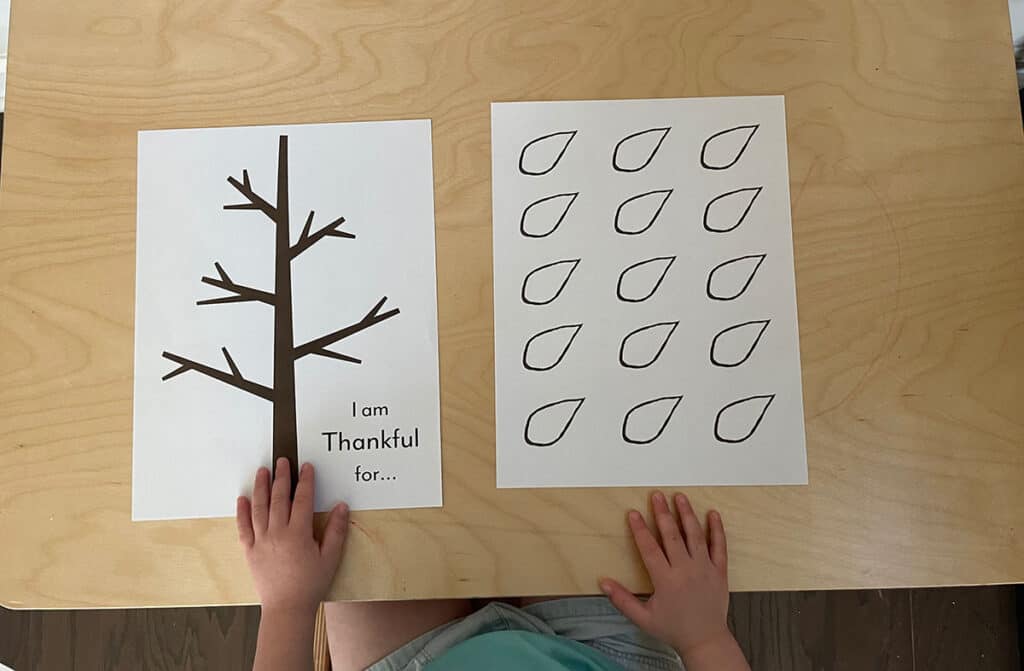
Here's how we made our thankful tree
I wanted to bring a some artistic quality to this project, so I thought it would be really fun to make the thankful tree in an Eric Carle style collage.
First, we printed out all the pages from my printable. We flipped over the leaf pages and painted the entire pages with liquid watercolor. Annie chose the colors yellow and green. But you can choose any color you’d like for the leaves.
I chose liquid watercolor because the color would come out light and bright and it would be easier to write what we’re thankful for on the leaves.
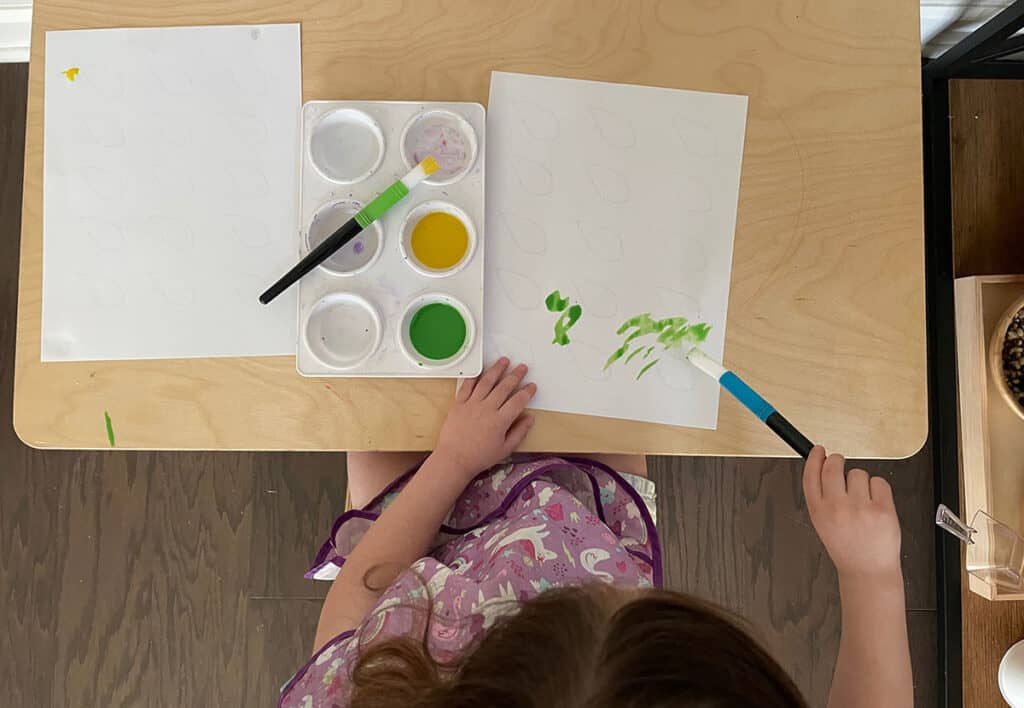
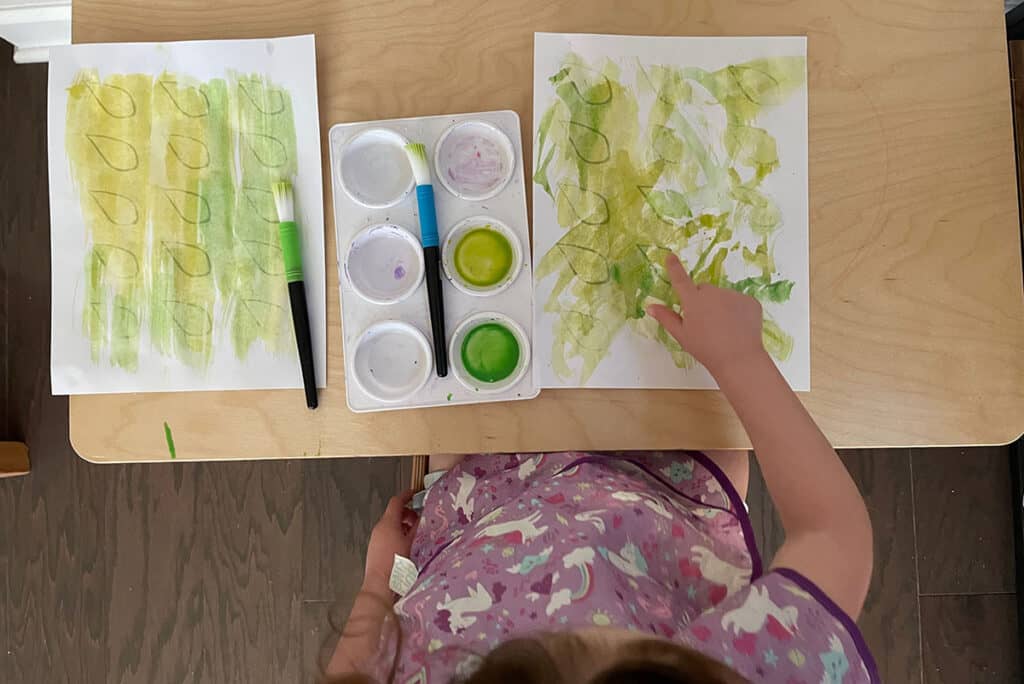
Once the leaf pages were completely dry, I cut the pages into long strips. Then we cut out all of the leaves on the lines.
The reason why we painted the back of the leaf pages was so that when you cut out the leaves, you don’t see any of the dark lines on your final tree.
Annie is still practicing using scissors, so she couldn’t cut them on the lines. She practiced cutting paper as I cut out the leaves.
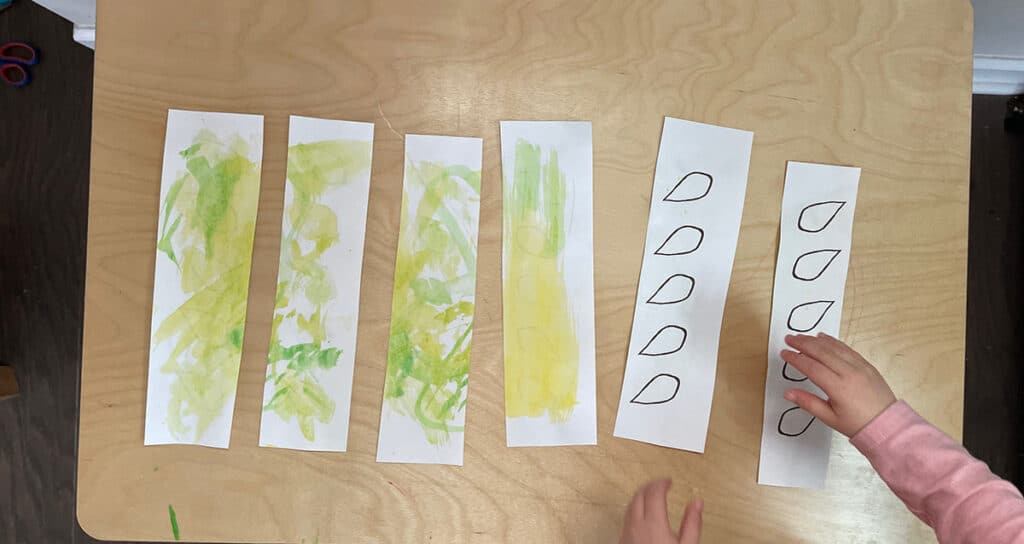
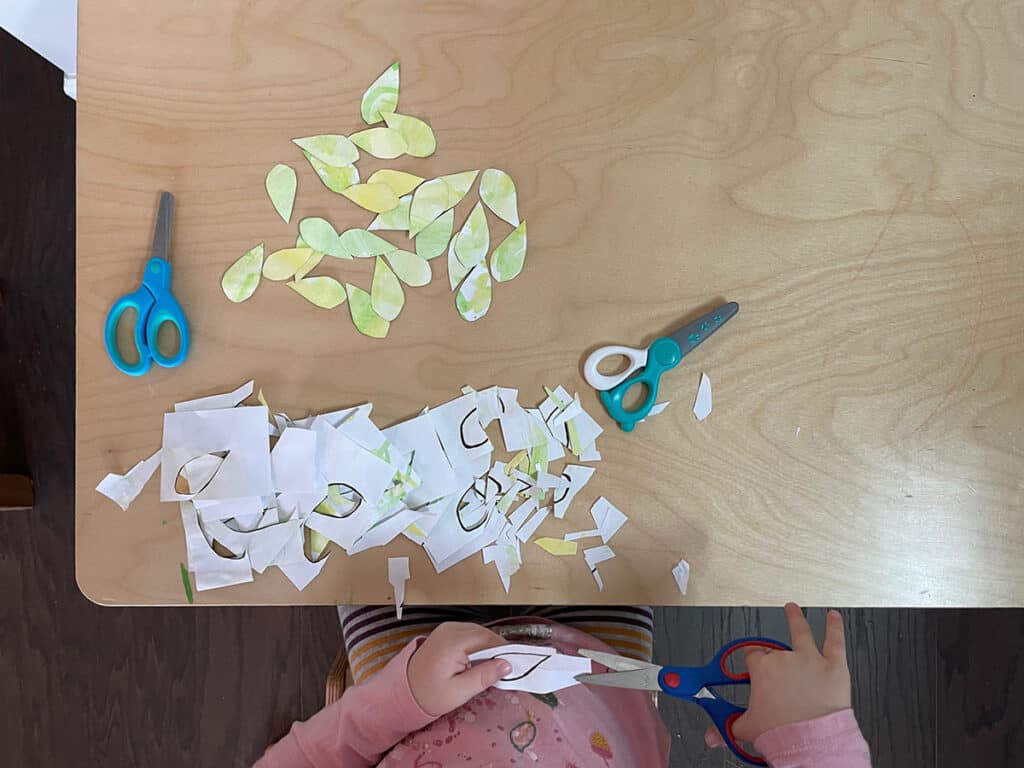
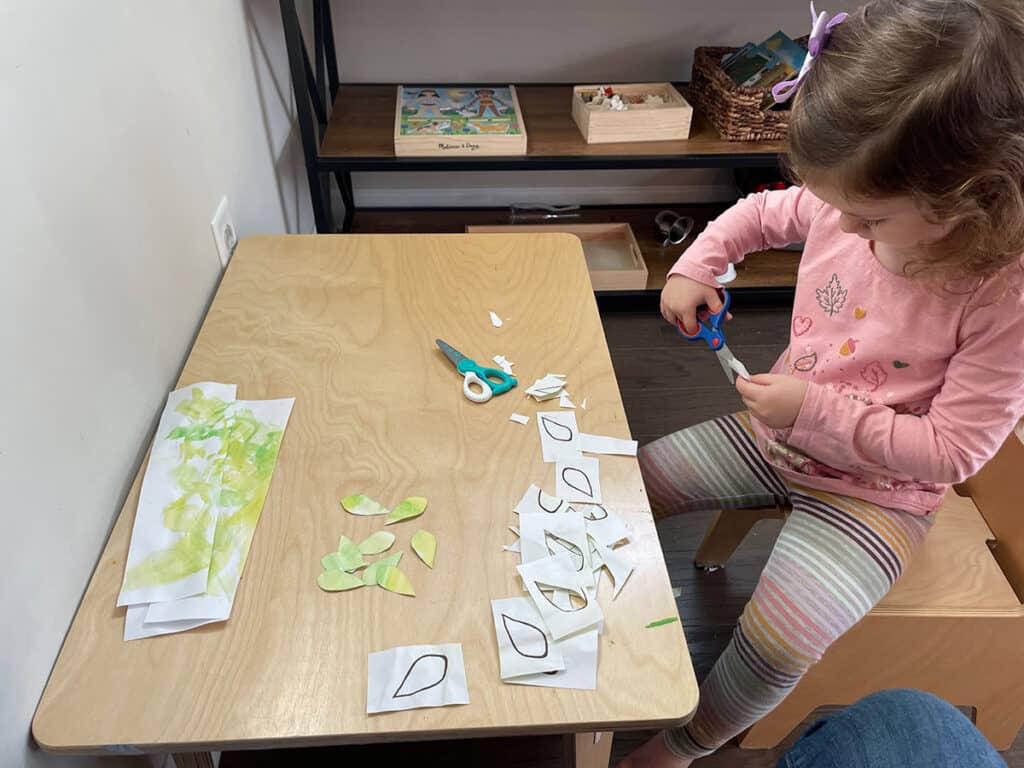
After we cut out all of the leaves, we got a blank piece of watercolor paper and painted the entire paper with brown acrylic paint. We used light brown, dark brown, and black acrylic paint and made vertical up and down strokes to look like a tree trunk.
You could also use tempera paint or any other type of paint you’d like to use here. I did try watercolor for the trunk at first but the colors were too washed out, so I painted over with acrylic because it would be bold and long-lasting.
You don’t have to do this step. You could use the blank tree trunk/branches picture page from the printable to glue the leaves on, but the painted trunk added to that Eric Carle effect we were going for.
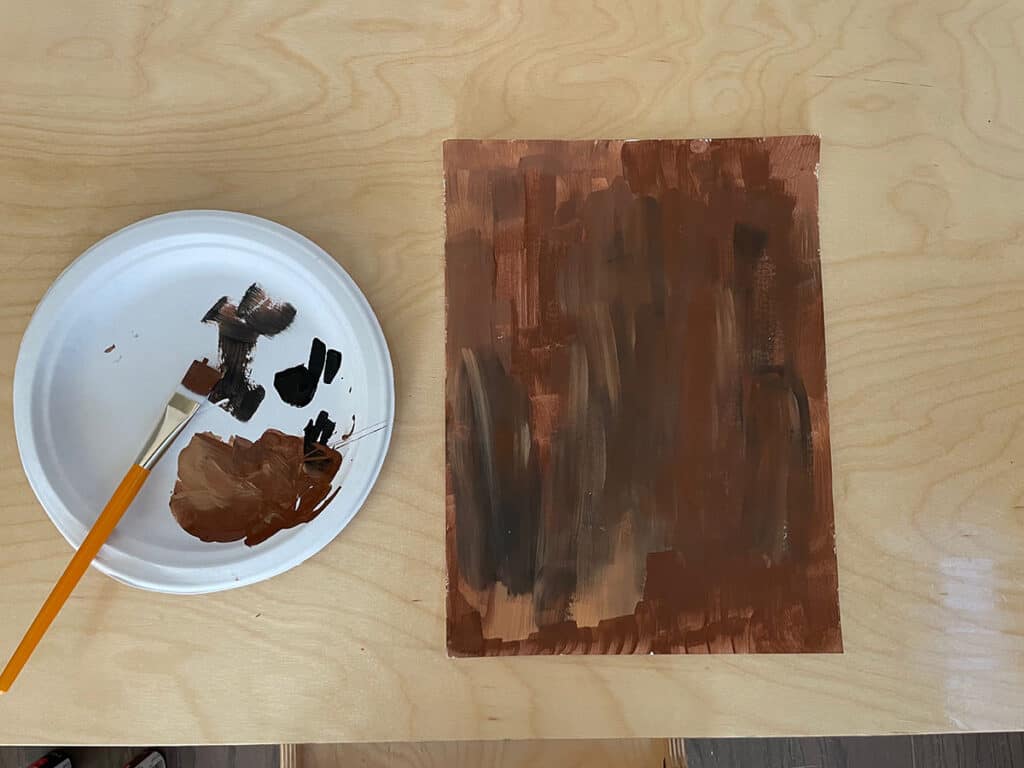
Then, I cut out the tree template from the printable, and traced it on the back of the painted brown paper. I cut out the tree.
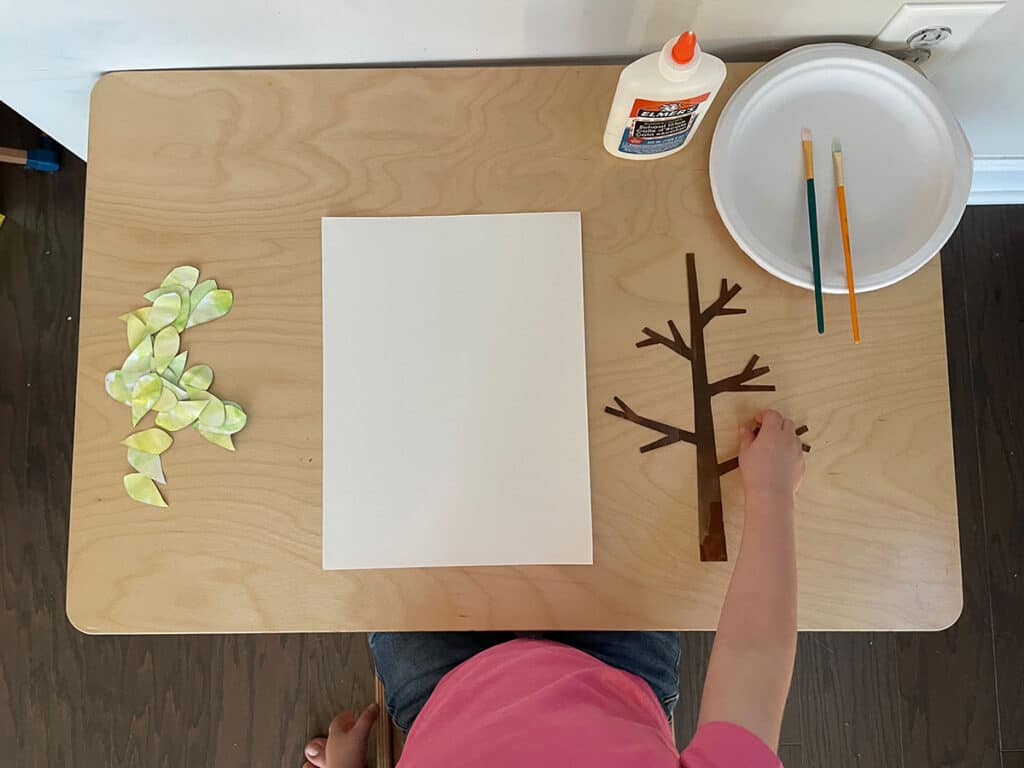
Next, we got another blank watercolor paper for the background. We glued the cut out tree with Elmers liquid glue and a paintbrush.
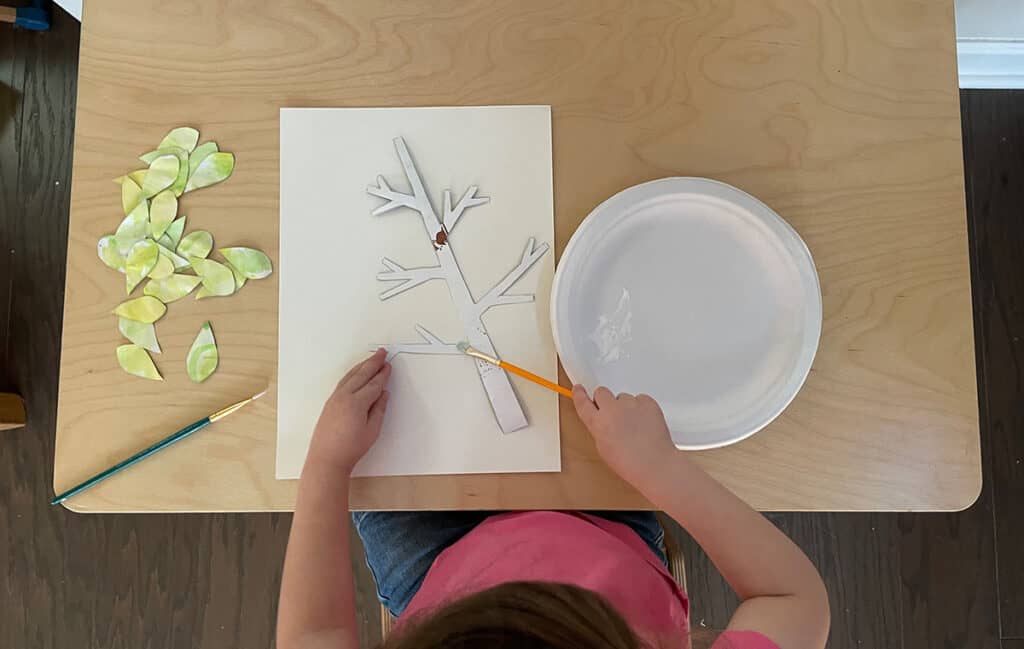
Once we glued the painted brown tree to the white background paper, we were ready to talk about what we are thankful for.
It ended up being a beautiful conversation thinking about all of the people, animals, activities, and other things in our lives that we like and appreciate.
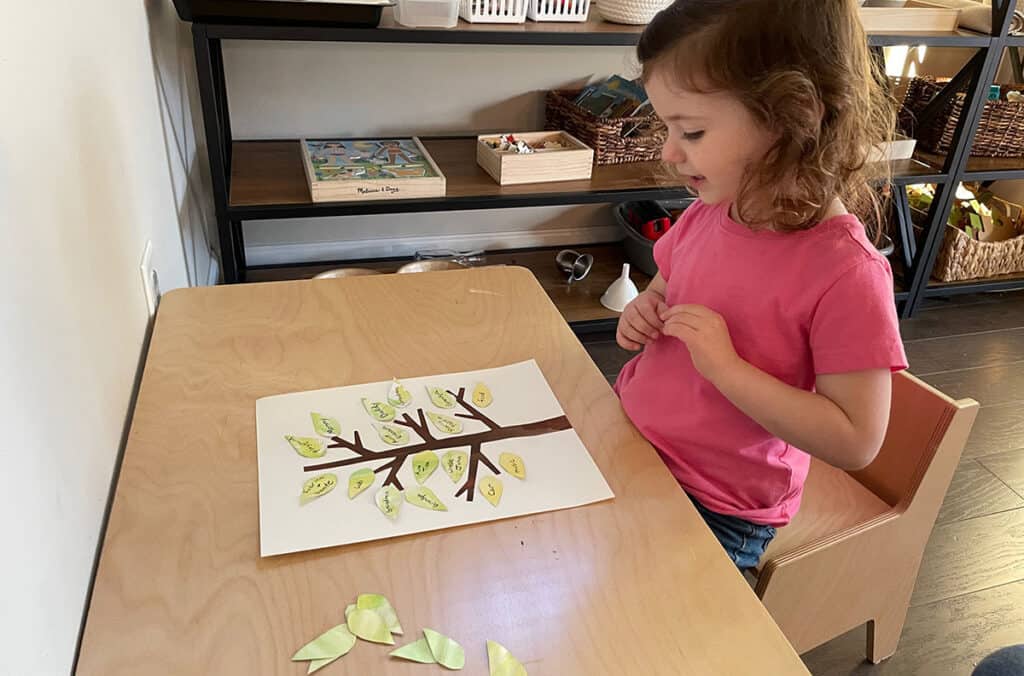
I wrote down all of the things that Annie was thankful for on each leaf. I noticed that all of these things were so important to her and she was so excited to talk about them!
I also extended this further and asked her why she was thankful for each person or thing. Even though I couldn’t fit all of the words on the small leaves, we talked about it.
You can also use prompts to help your child to think of things that she’s thankful for:
- Someone special in our life (mom, dad, grandma, grandpa, aunt, uncle, sister, brother, cousin, teacher)
- An activity
- A place
- A pet
- Food, water
- Car
- Home
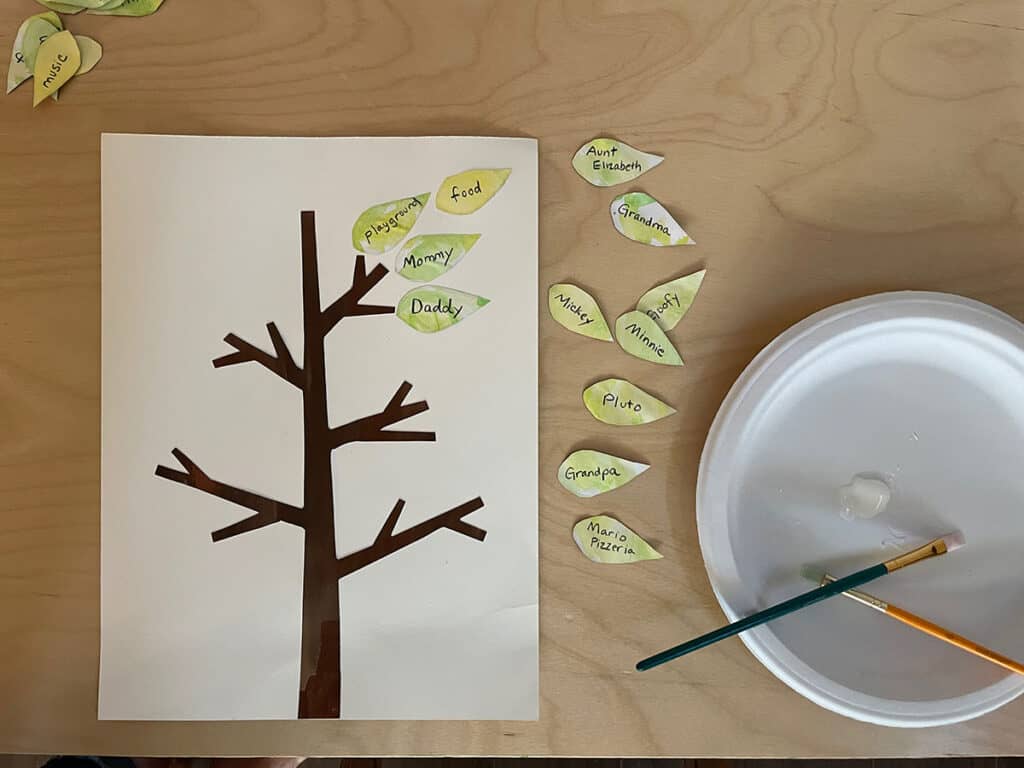
Once you finished writing everything your child’s thankful for on the leaves, glue the leaves to the tree. Place the leaves where you want them first, so you know where to glue them and how you want the tree to look.
Once your tree is finished you can hang it up, put it into a frame or put it in a special place.
We added all of the leaves at once because Annie was so excited! But you could add a new leaf every day leading up to Thanksgiving. You could also set it up so that all of the members of your family add what they’re thankful for. You could also have your Thanksgiving Day guests add to the tree.
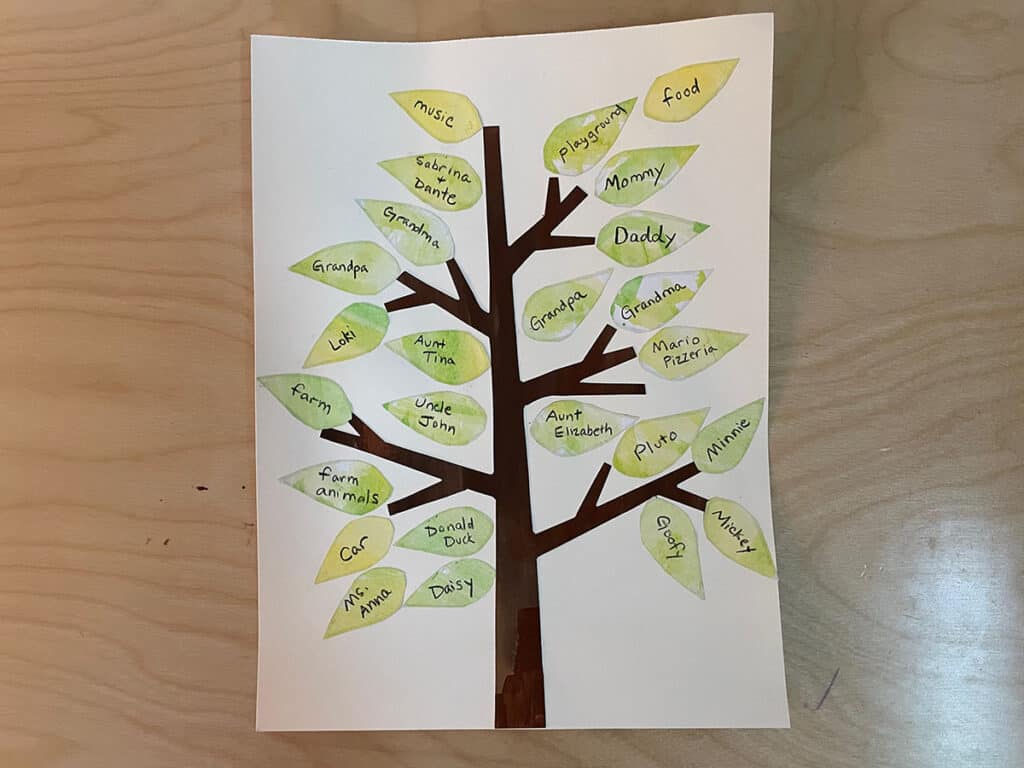
Concluding Thoughts
Peace education is a very big part of the Montessori philosophy. Peace education is naturally brought into every aspect of the classroom through activities such as a thankful tree. You can incorporate peace activities into your home, as well.
Teaching about peace can be as simple as talking about thankfulness and gratitude. The best way to share this with your child is to model gratitude. You can ask your child what they’re thankful for and at bedtime ask them what her favorite part of the day was. Be natural about it and bring it into your every day life.
The thankful tree turned out to be a beautiful and fun activity for Annie! What kind of thankfulness activities have you done with your child? Have you created a thankful tree together? How did it turn out? Leave a comment below!
More Resources
If you liked this Fall themed activity, you’ll enjoy my previous three posts:
A Really Cool Apple Stamping Gift
7 Montessori Fall Activities that are Fun and Easy to Set Up
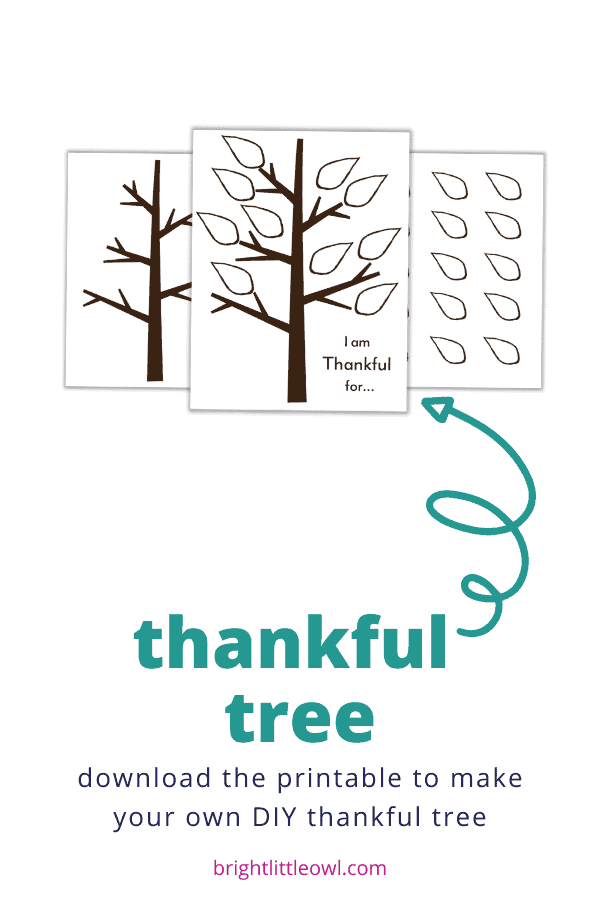
* To download your thankful tree printable, sign up for the resource library below.

Pingback: Try This Powerful Social Emotional Activity: The Love Light
Pingback: Best Glitter Jar Recipe for Calmness
In time to try with my kids. We often practice give me three things you are grateful of. This is so important to practice gratefulness and raise self sufficient children. Starts in all these subtle ways.
Lovely idea of the thankful tree, my son will love this 🙂
I love this! It is such a simple activity, but it also will have a big impact!
This is such a simple yet meaningful activity. Thanks for sharing!
I love this activity for teaching your kiddos to be thankful! We just checked out a couple of books at the library about Thanksgiving and what it means – this is how I will be sharing and teaching them about thankfulness this year!
Such a great idea. It is so important to teach our kids gratitude.
I love this idea of teaching kids to be thankful while also making it into a craft. Most kids learn by hands-on activities and this does just that. It makes a wonderful project that is fun to display as well!
I love this idea! Such a fun way to teach young children about gratitude. I’m excited to try it with my son. Great post!
This is such a fantastic idea for creativity and acknowledgment of what we are thankful for.
I love those watercolor leaves. What a fun and beautiful idea for the Thanksgiving holiday.
This is not just an activity for kids but it also teaches them the value of thanksgiving. We always say our thank you’s every bedtime prayer but putting it on a wall would be a great reminder too.
such an inspiring and thoughtful project for families and classrooms too.. thanks for sharing
I am reading this book called raising Grateful Children and I couldn’t agree more that we have to model gratitude with our children. The activity is a great place to start too. Love it.
This is so cute. I love the idea of a thankful tree.
I’m so glad you mentioned to write with some tips to the left and to the right because I totally wouldn’t have thought of that when writing. Great project!
I love thankful trees! We haven’t done one in a few years. Thanks for the reminder!
Very nice project!
Blessings,
Laurie
Ridge Haven Homestead
Homestead Blog Hop
I love this idea! I’ll have to try making a tree with my daughter.
This is such a great idea! My kids would love it❤
I love the look of the leaves! They are so pretty and not the typical fall tree look. Very nice!